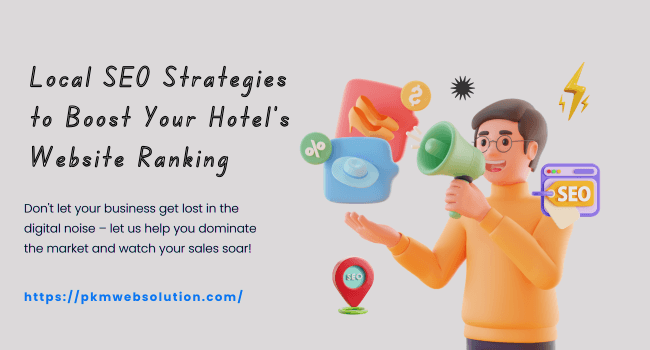
A 2020 survey from the National Association of Realtors shows that millennials are now the biggest group of home buyers in the U.S., surprising many. For years, people thought millennials were avoiding buying homes, choosing to rent or live with parents instead. But things are changing, and realtors must adapt to this digital-first generation. With online real estate sites like PKM Web Solutions growing fast, it’s clear that more home searches happen online. To stand out, your listings need to rank high on search engines. Let’s explore how SEO can help your real estate business.
What is Real Estate SEO?
Real estate SEO is a way to make your online content more visible so people can find it through search engines like Google, without paying for ads. This can include content on your website, social media, and apps. In the past, SEO mostly focused on using specific keywords and links to rank higher. Now, it’s more about creating a great experience for users that meets their needs.
SEO takes time, so don’t expect instant results. Think of it as a strategy to help reach your business goals both now and in the future. Most companies focus on Google for SEO, which makes sense since Google controls about 88.83% of the search market in the U.S. (as of April 2021, according to Stat counter Global Stats). But remember, Google isn’t the only search engine. Microsoft Bing and Yahoo have smaller shares (5.47% and 3%), but they also have less competition, so it’s easier to rank on them too.
Benefits of Implementing Real Estate SEO
As more real estate agents focus on SEO, being easy to find online can make a big difference for your business. Here are some benefits why you should start working on your SEO plan:
Bring in More Visitors and Make More Money
A good SEO company plan with quality content helps attract more people to your site. But it’s not just about getting traffic; it’s about getting the right traffic. By using relevant keywords and creating content that matters to your audience, you’re more likely to reach people who are actually interested in becoming clients. With proper calls-to-action, you can turn this traffic into income.
Make Your Brand Well-Known
Quality SEO content shows people that your business knows what it’s talking about, which builds trust. Every time someone reads your content and learns something useful, they see your brand in a positive way. The more people are aware of your brand, the higher your chances of turning readers into clients.
Protect Your Brand’s Image
Another big benefit is that SEO lets you control how your brand looks online. For example, if you’re part of an affiliate program, you could see an increase in traffic and revenue. But be careful not to let affiliates control all the traffic to your brand keywords, as you might not have control over how they represent your brand.
10 Real Estate SEO Tips
The internet has tons of information, so here are some easy-to-follow tips to kick-start your SEO strategy for success.
Check Out Your SEO Competitors
Knowing your industry competitors is great, but your SEO competitors might be different for each keyword. To figure out who they are, run a competitor analysis. Look at who shows up in search results when you search for your target keywords. Then, study what they do right and what they could improve. Check out their content, how they organize their pages, and how their websites look. By learning from their successes and mistakes, you’ll have a solid base to build your own SEO plan.
Start with Keyword Research
If you want to rank high on search engines, find out what words your potential clients type when they begin searching for homes. Then, check which of these keywords you can realistically target based on how often they’re searched and how tough the competition is. Using an SEO tool like PKM Web Solution can help you discover the top keywords that your competitors rank for. It can also show which keywords you already rank for, giving you an easy starting point.
Explore Long-Tail Keyword Opportunities
A successful SEO keyword isn’t always one with tons of searches or popularity. A long-tail keyword is a very specific word or phrase with lower search volume. Even though long-tail keywords are more niche, they also have less competition. If you find one that fits your audience well, you can rank higher more easily.
Create High-Quality Content with Your Clients in Mind
SEO is all about helping people find what they need on your site. In SEO, content is the most important thing, so focus on creating good stuff. Each page should focus on one well-researched keyword, but don’t overuse it. Instead, make sure the content is actually useful for people. The keyword just keeps you on track. The best content answers their questions and gives them info they can’t easily find somewhere else.
Do a Full Technical Audit of Your Site
To kick off a successful real estate SEO program, you need to check how well your website is technically set up. Here are some key things to look for:
- Response Codes: Look for codes like 404, 401, 410, 503, and 505.
- Website Structure: Check for orphan pages and how your internal links connect.
- Tags: Identify any problems with canonical and hreflang tags.
- Duplicate Content: Find duplicate URLs and any duplicate content issues.
- Sitemaps and Robots.txt: Ensure your XML sitemaps and robots.txt file are set up correctly.
- Web Security: Make sure your site has SSL certification for security.
- Negative SEO: Watch out for harmful backlinks pointing to your website.
Focus on Fixing Crawling and Indexing Problems
After checking your website for the right technical features, you should fix the problems that affect how search engines find and index your site. Even if your content is amazing, it won’t help you if search engines can’t find it. Some common issues that can stop search engines from crawling your site are broken links, old URLs, missing or incorrect sitemaps, duplicate pages, and slow loading speeds.
Have a Local Approach
Make it easy for people to reach you and find you. Start by claiming your Google My Business listing and improve it so you show up in the right search results. List your services and add useful posts. Whenever you can, make your website content local and include your name, address, and phone number where it fits.
Use Real Estate Agents Schema Markup
Schema markup, or structured data, is a special code you can add to your website. This code helps search engines understand your site better, making it easier for people to find the info they want. There are two types of schema markup made for real estate businesses: Real Estate Listing and Real Estate Agent schema.
With the Real Estate Listing schema, you can provide important details to search engines. This makes it clear to both search engines and potential clients when the listing was published, where the property is located, its price, and how long the lease lasts. If you use schema markup effectively, you might even get a featured snippet in search results!
Get Local Backlinks to Your Real Estate Website
Just like in real life, getting recommendations from people can really boost your business. A backlink is when another website links to yours. A local backlink comes from a local online source, like a business directory, a local news site, or a blog. These local backlinks show search engines that you’re a trusted source in your area and also help bring interested visitors to your website.
Keep an Eye on Your Keyword Rankings
To check how well you’re doing and reach your goals, you need to keep track of your keyword rankings. By watching for any changes in how many people search for your keywords or how well they rank, you can adjust your strategy if needed. Keeping track also helps you see which pages don’t rank well and need more work to improve.
5 SEO Tactics Real Estate Agents Should Avoid
Using certain SEO tactics can get you in trouble with Google. Here are some things you should definitely not do:
- Keyword stuffing: Don’t repeat your main keyword too many times.
- Link buying: Don’t pay for links; you should earn them instead.
- Duplicate content: Avoid using the same article and just changing the location keyword each time.
- Sneaky redirects: Don’t trick visitors by sending them to a different web page than the one they wanted.
- Hidden text: Don’t hide text by matching its color to the background, putting it off-screen, or hiding it behind an image just to stuff keywords on the page.
Conclusion
Using a real estate SEO strategy is a smart move for realtors who want to get more people to visit their websites and attract more customers, whether they’re buying or selling. By doing keyword research and improving your website’s backend, you can make sure your pages show up at the top of search engine results. This can boost your sales and lower your spending on ads, so all the hard work you put in will pay off in the long run.
FAQs
Do real estate agents need SEO?
Yes, real estate agents need SEO to show up in search results when people look for local agents.
What does SEO stand for in real estate?
SEO in real estate boosts your website’s traffic, helps you get leads, and increases sales by improving search visibility.
What is the SEO for real estate in 2024?
In 2024, real estate SEO focuses on local searches, using “near me” keywords and specific neighborhood info to stand out.
What is the ROI of real estate SEO?
Real estate SEO brings in more traffic and profits than social media, but it takes time to see results since it’s a long-term strategy.



